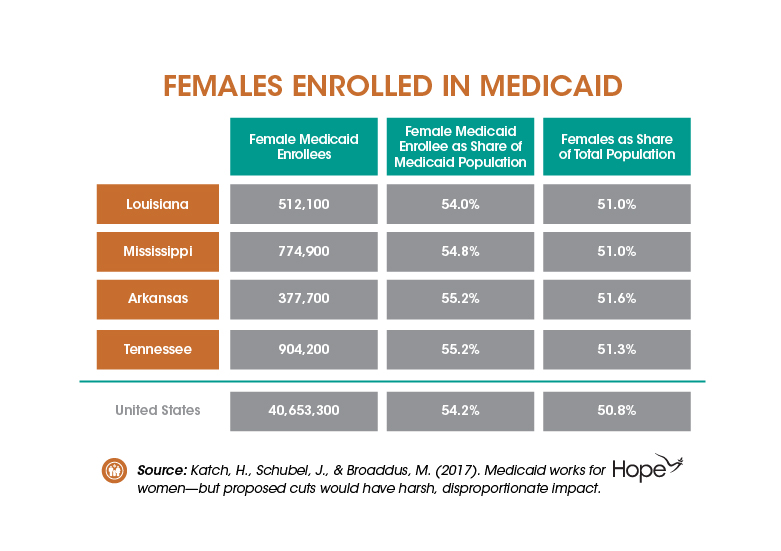Medicaid Works for Women
May 23rd, 2017
The proposed cuts to Medicaid in the American Health Care Act (AHCA) would result in devastating consequences for the nearly 2.6 million women in the Mid South states of Arkansas, Louisiana, Mississippi and Tennessee who rely on the program. A new report from the Center on Budget and Policy Priorities highlights that women would bear a disproportionate share of the burden as a result of the proposed deep cuts to Medicaid.
The AHCA would slash more than $800 billion from Medicaid over 10 years (including $20 billion in Mid South states) by effectively eliminating the Affordable Care Act’s (ACA) expansion of Medicaid and imposing a “per capita cap” on the program. The per capita cap would break the federal government’s decades-long structure to pay a fixed share of states’ Medicaid costs.
Under the current proposal, women would bear a disproportionate share of the burden of these cuts because they not only make up a majority (54.8 percent) of the Mid South’s Medicaid beneficiaries (See Table), but are much more likely to use Medicaid’s long-term services.
Click to enlarge
These cuts would put at risk the critical support Medicaid provides for women:
- Medicaid provides health care for nearly half of all pregnant women, supporting them through their pregnancies and ensuring that their children have a healthy start. Access to health care is essential for “promoting maternal health and positive birth outcomes,” particularly in a state like Mississippi, which has the highest rates of preterm births (13.1 percent) and infant mortality (9.6 deaths per 1,000 live births) in the nation.
- Because women live longer than men, women are much more likely to use Medicaid’s long-term services and supports as they age. The program also plays an especially critical role for older women of color who are also enrolled in Medicare, providing insurance to almost half (46.2 percent) of Hispanic and African American women over age 65 in Mid South states.
- Eliminating the ACA’s Medicaid expansion would jeopardize coverage for almost 120,000 women in Arkansas and Louisiana who gained coverage as a result of the expansion just this year.
For many women, the benefits of the ACA extend beyond access to health care. The ACA not only created an avenue in which women can acquire affordable, comprehensive health insurance coverage but also created a pathway to lifesaving healthcare services. It is imperative that these gains for women continue to advance, not regress, to ensure the healthcare needs of women are met.
Sources:
Katch, H., Schubel, J., & Broaddus, M. (2017). Medicaid works for women—but proposed cuts would have harsh, disproportionate impact. Retrieved from http://www.cbpp.org/research/health/medicaid-works-for-women-but-proposed-cuts-would-have-harsh-disproportionate-impact
The Henry J. Kaiser Family Foundation’s State Health Facts. Data Source: 2017 Open Enrollment Period Final Enrollment Report and 2017 Marketplace Open Enrollment Period Public Use Files, Centers for Medicare and Medicaid Services (CMS), Department of Health and Human Services (HHS), March 15, 2017
The Henry J. Kaiser Family Foundation’s State Health Facts. Data Source: Matthews, TJ, M.S., et. al. Infant Mortality Statistics from the 2013 Period Linked Birth/Infant Death Data Set. Division of Vital Statistics, CDC. National Vital Statistics Report 64 (9), August 6, 2015.
The Henry J. Kaiser Family Foundation’s State Health Facts. Data Source: The Centers for Disease Control and Prevention (CDC), National Vital Statistics Reports (NVSR), Vol. 66, No. 1: Births: Final Data for 2015, January 5, 2017








